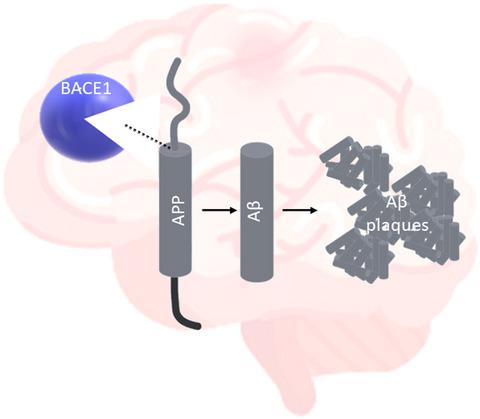当前位置:
X-MOL 学术
›
J. Neurochem.
›
论文详情
Our official English website, www.x-mol.net, welcomes your
feedback! (Note: you will need to create a separate account there.)
Serum beta-secretase 1 (BACE1) activity increases in patients with mild cognitive impairment
Journal of Neurochemistry ( IF 4.2 ) Pub Date : 2021-09-17 , DOI: 10.1111/jnc.15513 Giovanni Zuliani 1 , Alessandro Trentini 2 , Gloria Brombo 1 , Valentina Rosta 1 , Patrizia Guasti 1 , Tommaso Romagnoli 1 , Michele Polastri 1 , Lisa Marabini 1 , Dario Pedrini 1 , Chiara Pistolesi 1 , Salvatore Pacifico 2 , Remo Guerrini 2 , Davide Seripa 3 , Carlo Cervellati 1
Journal of Neurochemistry ( IF 4.2 ) Pub Date : 2021-09-17 , DOI: 10.1111/jnc.15513 Giovanni Zuliani 1 , Alessandro Trentini 2 , Gloria Brombo 1 , Valentina Rosta 1 , Patrizia Guasti 1 , Tommaso Romagnoli 1 , Michele Polastri 1 , Lisa Marabini 1 , Dario Pedrini 1 , Chiara Pistolesi 1 , Salvatore Pacifico 2 , Remo Guerrini 2 , Davide Seripa 3 , Carlo Cervellati 1
Affiliation

|
Beta-secretase 1 (BACE1) is considered as the key enzyme in amyloid-β formation. Previous works suggest that high BACE1 activity may be present in brain, cerebrospinal fluid and serum of patients with late-onset Alzheimer's disease (LOAD) as well as mild cognitive impairment (MCI). Therefore, we evaluated whether serum BACE1 activity increases in MCI patients and is associated with the progression from MCI to dementia. BACE1 activity was measured in the serum of 259 MCI patients (162 amnestic—aMCI, 97 non-amnestic—naMCI) and 204 healthy Controls. After a median follow-up of 32 months (range: 10–153), 116 MCI progressed to dementia (87 aMCI and 29 naMCI). Serum BACE1 activity was higher in MCI compared with Controls (p < 0.001), and in aMCI with brain atrophy compared with naMCI without brain atrophy (p = 0.04). No difference in BACE1 activity emerged between converter and non-converter MCI, and this was true for both aMCI and naMCI. However, among aMCI with better cognitive performance (n. 163, MMSE score ≥24/30) those converting to dementia had higher BACE1 activity compared to stable ones (p = 0.05). This was not associated with an increased risk to develop dementia (hazard ratio: 1.65; 95% confidence interval: 0.67–4.01). In conclusion, serum BACE1 activity significantly increased in MCI patients (both amnestic and non-amnestic) compared with Controls. Moreover, higher serum BACE1 activity was observed only among aMCI with a better cognitive performance who progressed to dementia, suggesting that a dysregulation of this enzyme might be an early event primarily associated with neurodegeneration.
中文翻译:

轻度认知障碍患者的血清 β-分泌酶 1 (BACE1) 活性增加
β-分泌酶 1 (BACE1) 被认为是淀粉样蛋白 β 形成的关键酶。先前的研究表明,晚发性阿尔茨海默病 (LOAD) 以及轻度认知障碍 (MCI) 患者的大脑、脑脊液和血清中可能存在高 BACE1 活性。因此,我们评估了 MCI 患者的血清 BACE1 活性是否增加,并与 MCI 进展为痴呆有关。在 259 名 MCI 患者(162 名遗忘症 - aMCI,97 名非遗忘症 - naMCI)和 204 名健康对照者的血清中测量了 BACE1 活性。中位随访 32 个月(范围:10-153)后,116 名 MCI 进展为痴呆(87 名 aMCI 和 29 名 naMCI)。与对照组相比,MCI 中的血清 BACE1 活性更高(p < 0.001),并且与无脑萎缩的 naMCI 相比,有脑萎缩的 aMCI 中的血清 BACE1 活性更高(p = 0.04)。转化者和非转化者 MCI 之间的 BACE1 活性没有差异,aMCI 和 naMCI 都是如此。然而,在具有更好认知表现(n. 163,MMSE 评分≥24/30)的 aMCI 中,那些转变为痴呆症的人与稳定的人相比具有更高的 BACE1 活性(p = 0.05)。这与患痴呆症的风险增加无关(风险比:1.65;95% 置信区间:0.67–4.01)。总之,与对照组相比,MCI 患者(遗忘和非遗忘)的血清 BACE1 活性显着增加。此外,仅在认知能力较好并进展为痴呆的 aMCI 中观察到较高的血清 BACE1 活性,这表明该酶的失调可能是主要与神经变性相关的早期事件。
更新日期:2021-10-27
中文翻译:

轻度认知障碍患者的血清 β-分泌酶 1 (BACE1) 活性增加
β-分泌酶 1 (BACE1) 被认为是淀粉样蛋白 β 形成的关键酶。先前的研究表明,晚发性阿尔茨海默病 (LOAD) 以及轻度认知障碍 (MCI) 患者的大脑、脑脊液和血清中可能存在高 BACE1 活性。因此,我们评估了 MCI 患者的血清 BACE1 活性是否增加,并与 MCI 进展为痴呆有关。在 259 名 MCI 患者(162 名遗忘症 - aMCI,97 名非遗忘症 - naMCI)和 204 名健康对照者的血清中测量了 BACE1 活性。中位随访 32 个月(范围:10-153)后,116 名 MCI 进展为痴呆(87 名 aMCI 和 29 名 naMCI)。与对照组相比,MCI 中的血清 BACE1 活性更高(p < 0.001),并且与无脑萎缩的 naMCI 相比,有脑萎缩的 aMCI 中的血清 BACE1 活性更高(p = 0.04)。转化者和非转化者 MCI 之间的 BACE1 活性没有差异,aMCI 和 naMCI 都是如此。然而,在具有更好认知表现(n. 163,MMSE 评分≥24/30)的 aMCI 中,那些转变为痴呆症的人与稳定的人相比具有更高的 BACE1 活性(p = 0.05)。这与患痴呆症的风险增加无关(风险比:1.65;95% 置信区间:0.67–4.01)。总之,与对照组相比,MCI 患者(遗忘和非遗忘)的血清 BACE1 活性显着增加。此外,仅在认知能力较好并进展为痴呆的 aMCI 中观察到较高的血清 BACE1 活性,这表明该酶的失调可能是主要与神经变性相关的早期事件。











































 京公网安备 11010802027423号
京公网安备 11010802027423号